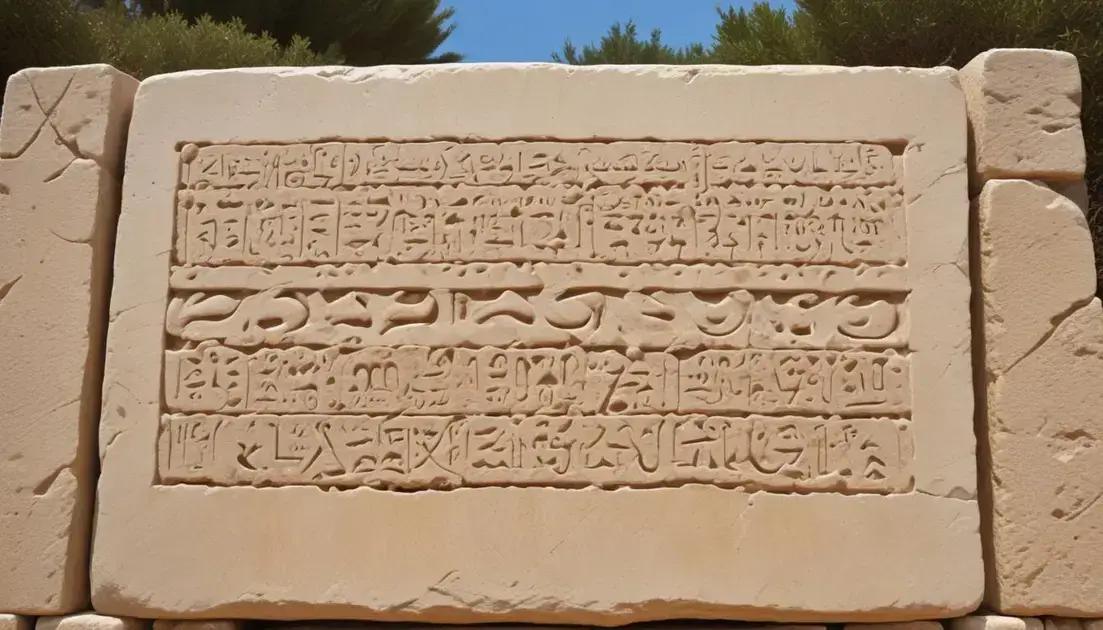
Phoenician Alphabet: From Semitic to the Modern West
The Phoenician Alphabet significantly influenced modern writing systems, serving as a precursor to many languages, including Greek and Latin. Its simple phonetic structure made it easy to learn and adopt across cultures, facilitating trade and cultural exchange. Archaeological findings reveal the deep impact of the Phoenician language on literacy and communication, demonstrating how its legacy continues to shape languages we use today.
Phoenician Alphabet is more than just a relic of the past—it’s a bridge connecting ancient civilizations to today’s world. Ready to explore its journey?
The origins of the Phoenician Alphabet
The Phoenician Alphabet has deep roots in ancient history. It originated around 1200 BCE in the region we know today as Lebanon. This alphabet was developed by the Phoenicians, a seafaring people who traded widely across the Mediterranean. They needed a simple way to record their transactions and communicate efficiently.
Influences on the Alphabet
The Phoenician Alphabet borrowed elements from earlier writing systems. One key influence was the Egyptian hieroglyphs, which used symbols for sounds and ideas. However, the Phoenicians made it simpler by focusing on sounds. They created a phonetic script with just 22 letters.
Trade and Spread
The Phoenicians were known for their trade routes. As they traveled and traded, they introduced their alphabet to other cultures. This made it a vital part of communication in the region. Countries like Greece and Rome adopted and adapted the Phoenician script. This led to the creation of the Greek and Latin alphabets we use today.
Importance of Simplicity
One reason for the success of the Phoenician Alphabet was its simplicity. Unlike ciphers or complex character systems, it was easy to learn. This encouraged more people to read and write. The ability to communicate effectively helped spread culture and ideas throughout the Mediterranean.
The spread of the Alphabet Across Cultures
The Phoenician Alphabet spread widely thanks to trade and exploration. As Phoenician merchants traveled, they took their writing system with them. This made it easier to communicate about goods and business.
Reaching New Lands
As the Phoenicians settled in new areas, they shared their alphabet. Places like Cyprus and North Africa saw the introduction of this script. Each culture adapted the alphabet to fit their own languages and needs.
Influencing Other Scripts
The Greeks were one of the first cultures to adopt the Phoenician Alphabet. They modified it and added vowels. This change helped make reading and writing more accessible to everyone. Later, the Romans would take the Greek version to create our Latin alphabet.
Cultural Exchange
The spread of the alphabet was not just about writing. It also facilitated cultural exchange. Ideas, trade, and traditions moved freely between societies. This helped civilizations grow and thrive.
By sharing their writing system, the Phoenicians linked various cultures. It created a common ground for communication across regions. The effect of this exchange is still felt in languages today.
Influence on Modern Writing Systems
The Phoenician Alphabet has had a huge impact on modern writing systems. Its simple design made it easy for other cultures to adapt. As a result, many alphabets today trace their roots back to it.
Greek and Latin Alphabets
The Greeks took the Phoenician script and added vowels. This change was game-changing. It allowed people to read and write more easily. Later, the Romans borrowed the Greek version to create the Latin alphabet.
Connection to Modern Languages
Today, languages like English, Spanish, and French use the Latin alphabet. This shows how the Phoenician Alphabet’s influence still exists. Every letter we write has a history tied to those ancient symbols.
Spread Through Trade and Culture
As cultures connected through trade, the alphabet spread widely. Each society made its own adjustments based on its language and needs. This blending of alphabets contributed to writing systems worldwide.
The impact of the Phoenician Alphabet goes beyond just letters. It helped shape literary traditions and education for centuries. Today, it remains a vital part of human communication.
Legacy of the Phoenician Language
The Phoenician language has a rich legacy that continues to influence us today. As one of the first alphabetic languages, it laid the groundwork for many modern scripts. Its design was simple yet effective.
Impact on Other Languages
Phoenician inspired many languages throughout history. For example, the Greek and Latin languages both drew from it. This connection shows just how important Phoenician was in shaping languages we use now.
Archaeological Discoveries
Archaeological finds have revealed much about Phoenician culture and language. These discoveries include ancient inscriptions and writings. They help us understand their everyday lives, trade, and interactions.
Connection to Modern Civilization
The legacy of the Phoenician language goes beyond just letters. It played a huge role in spreading knowledge and ideas. The skills learned from Phoenician sailors and traders contributed to the growth of early civilizations.
Today, many researchers continue to study the Phoenician language. They explore its influence on modern writing and communication. This ongoing interest shows that the Phoenicians’ contributions are far from forgotten.
Conclusion
In summary, the Phoenician Alphabet has played a crucial role in shaping modern writing systems. Its simple design made it easy for other cultures to adopt and adapt. The legacy of the Phoenician language continues to influence languages we use today.
Not only did it connect various civilizations through trade, but it also facilitated the spread of knowledge and culture. The discoveries made by archaeologists show us just how rich and impactful Phoenician history is. Understanding this history helps us appreciate the roots of our own communication.
By learning about the Phoenician Alphabet and language, we acknowledge the importance of their contributions. Their influence is a reminder of how interconnected our world has been throughout history. The legacy of the Phoenician language lives on, shaping our lives even now.


